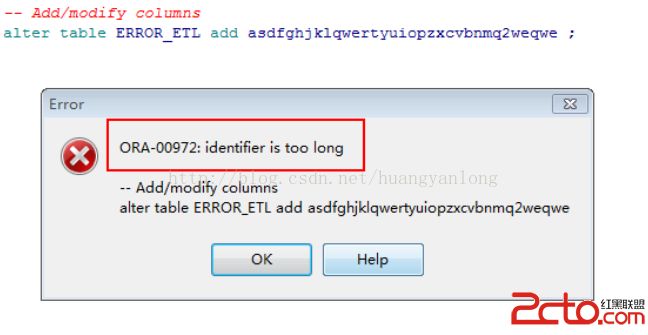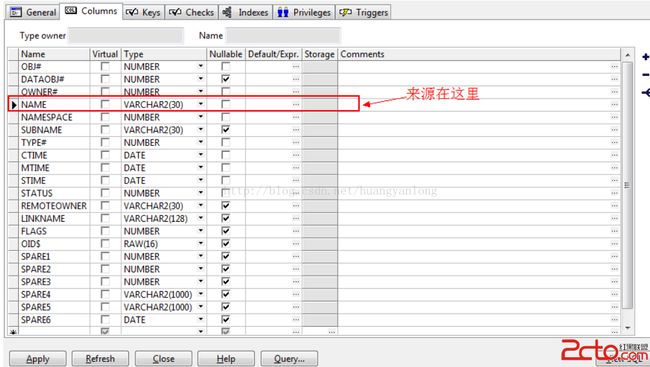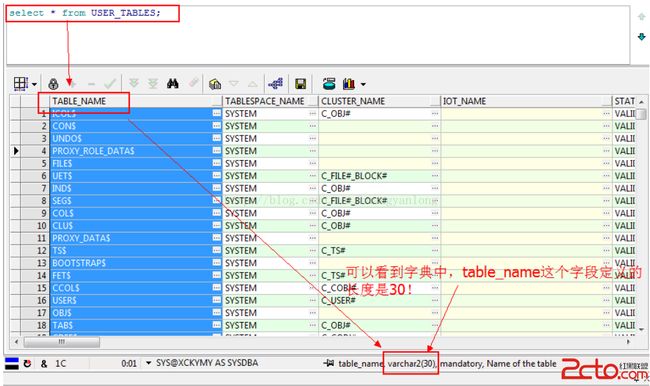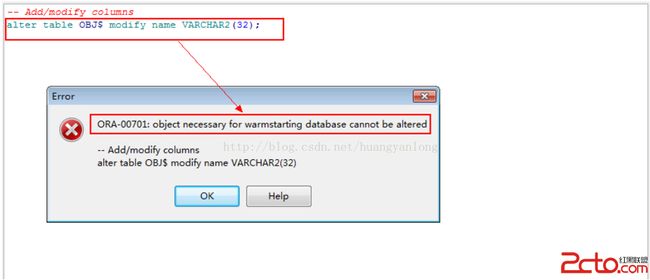oracle的长度限制
-
一. varchar2长度限制问题
1) 表字段创建最大长度:4000
SQL> CREATE TABLE t_test1(a VARCHAR2( 4000 )); --正确
Table created.
SQL> CREATE TABLE t_test2(a VARCHAR2( 4001 )); --错误
CREATE TABLE t_test2(a VARCHAR2(4001))
*
ERROR at line 1:
ORA-00910: specified length too long for its datatype
2) plsql变量定义最大长度:32767
SQL> CREATE OR REPLACE PROCEDURE sp_test1 (p IN VARCHAR2 DEFAULT NULL ) --正确
IS
x_var VARCHAR2 ( 32767 );
BEGIN
DBMS_OUTPUT.put_line (p);
END;
/
Procedure created.
SQL> CREATE OR REPLACE PROCEDURE sp_test2 (p IN VARCHAR2 DEFAULT NULL ) --错误
IS
x_var2 VARCHAR2 ( 32768 );
BEGIN
NULL;
END;
/
Warning: Procedure created with compilation errors.
SQL> show error;
Errors for PROCEDURE SP_TEST2:
LINE/COL ERROR
-------- -----------------------------------------------------------------
3/23 PLS-00215: String length constraints must be in range (1 ..
32767)
3) plsql调用参数最大长度:65535
SQL> DECLARE
lv_test VARCHAR2 (32767);
BEGIN
FOR i IN 1 .. 32767
LOOP
lv_test := lv_test || '-';
END LOOP;
sp_test1 (LENGTHB (lv_test || lv_test || ' 1 '));
END;
/
65535
SQL> DECLARE
lv_test VARCHAR2 (32767);
BEGIN
FOR i IN 1 .. 32767
LOOP
lv_test := lv_test || '-';
END LOOP;
sp_test1 (LENGTHB (lv_test || lv_test || ' 12 '));
END;
/
DECLARE
*
ERROR at line 1:
ORA-06502: PL/SQL: numeric or value error: character string buffer too small
ORA-06512: at line 9
二. dbms_output.put_line长度限制问题
对于10g以上版本(包括10g), dbms_output.put_line的最大长度限制是 32767 . 如果报错buffer overflow, 执行如下语句即可:
set serveroutput ON SIZE UNLIMITED FORMAT WORD_WRAPPED
对于10g以下版本dbms_output.put_line最大长度限制是 255 .
-
-
oracle表名、字段名等对象的命名长度限制
今天在为某系统数据库结构整理升级脚本时,遇到了“命名字节过长的错误”,类似于下面的截图语句:
由于升级的结构中对于字段名的命名根据业务进行了修改,出现了命名过长的情况。
这里想说一下,对于oracle,表名、字段名等对象命名字节个数限制在了30个字节!是无法更改的,这是oracle的固化设置。
我们可以通过查看数据库字典进一步验证一下。先思考一下,哪里可以获得关于这类命名的信息呢?有没有想到USER_TAB_COLUMNS,USER_CONSTRAINTS这一类的视图。我们来做一个验证。
实验:
在sys用户下,查看user_tables这个视图,可以发现在table_name这个字段,类型为varchar,长度为30,这里记录的表的名称,如下:
再进一步查看视图的结构,如下:
|
1
2
3
4
5
6
7
8
9
10
11
12
13
14
15
16
17
18
19
20
21
22
23
24
25
26
27
28
29
30
31
32
33
34
35
36
37
38
39
40
41
42
43
44
45
46
47
48
49
50
51
52
53
54
55
56
57
58
59
60
61
62
63
64
65
66
67
68
69
70
71
72
73
74
75
76
77
78
79
80
81
82
83
84
85
86
87
88
89
90
91
92
93
94
95
96
97
98
99
100
101
102
103
104
105
106
107
108
109
110
111
112
113
114
115
116
117
118
119
120
121
122
123
124
125
126
127
128
129
130
131
132
133
134
135
136
137
138
139
140
141
142
143
144
145
146
147
148
149
150
151
152
153
154
155
156
157
158
159
160
161
162
163
164
165
166
167
168
169
170
171
172
173
174
175
176
177
178
179
180
181
182
183
184
185
186
187
188
189
190
191
192
193
194
|
create
or
replace
view
user_tables
(table_name, tablespace_name, cluster_name, iot_name, status, pct_free, pct_used, ini_trans, max_trans, initial_extent, next_extent, min_extents, max_extents, pct_increase, freelists, freelist_groups, logging, backed_up, num_rows, blocks, empty_blocks, avg_space, chain_cnt, avg_row_len, avg_space_freelist_blocks, num_freelist_blocks, degree, instances, cache, table_lock, sample_size, last_analyzed, partitioned, iot_type,
temporary
, secondary, nested, buffer_pool, flash_cache, cell_flash_cache, row_movement, global_stats, user_stats, duration, skip_corrupt, monitoring, cluster_owner, dependencies, compression, compress_for, dropped, read_only, segment_created, result_cache)
as
select
o.
name
,
decode(bitand(t.property,2151678048), 0, ts.
name
,
decode(t.ts#, 0,
null
, ts.
name
)),
decode(bitand(t.property, 1024), 0,
null
, co.
name
),
decode((bitand(t.property, 512)+bitand(t.flags, 536870912)),
0,
null
, co.
name
),
decode(bitand(t.trigflag, 1073741824), 1073741824,
'UNUSABLE'
,
'VALID'
),
decode(bitand(t.property, 32+64), 0, mod(t.pctfree$, 100), 64, 0,
null
),
decode(bitand(ts.flags, 32), 32, to_number(
NULL
),
decode(bitand(t.property, 32+64), 0, t.pctused$, 64, 0,
null
)),
decode(bitand(t.property, 32), 0, t.initrans,
null
),
decode(bitand(t.property, 32), 0, t.maxtrans,
null
),
decode(bitand(t.property, 17179869184), 17179869184,
ds.initial_stg * ts.blocksize,
s.iniexts * ts.blocksize),
decode(bitand(t.property, 17179869184), 17179869184,
ds.next_stg * ts.blocksize,
s.extsize * ts.blocksize),
decode(bitand(t.property, 17179869184), 17179869184,
ds.minext_stg, s.minexts),
decode(bitand(t.property, 17179869184), 17179869184,
ds.maxext_stg, s.maxexts),
decode(bitand(ts.flags, 3), 1, to_number(
NULL
),
decode(bitand(t.property, 17179869184), 17179869184,
ds.pctinc_stg, s.extpct)),
decode(bitand(ts.flags, 32), 32, to_number(
NULL
),
decode(bitand(o.flags, 2), 2, 1,
decode(bitand(t.property, 17179869184), 17179869184,
ds.frlins_stg, decode(s.lists, 0, 1, s.lists)))),
decode(bitand(ts.flags, 32), 32, to_number(
NULL
),
decode(bitand(o.flags, 2), 2, 1,
decode(bitand(t.property, 17179869184), 17179869184,
ds.maxins_stg, decode(s.groups, 0, 1, s.groups)))),
decode(bitand(t.property, 32+64), 0,
decode(bitand(t.flags, 32), 0,
'YES'
,
'NO'
),
null
),
decode(bitand(t.flags,1), 0,
'Y'
, 1,
'N'
,
'?'
),
t.rowcnt,
decode(bitand(t.property, 64), 0, t.blkcnt,
null
),
decode(bitand(t.property, 64), 0, t.empcnt,
null
),
decode(bitand(t.property, 64), 0, t.avgspc,
null
),
t.chncnt, t.avgrln, t.avgspc_flb,
decode(bitand(t.property, 64), 0, t.flbcnt,
null
),
lpad(decode(t.degree, 32767,
'DEFAULT'
, nvl(t.degree,1)),10),
lpad(decode(t.instances, 32767,
'DEFAULT'
, nvl(t.instances,1)),10),
lpad(decode(bitand(t.flags, 8), 8,
'Y'
,
'N'
),5),
decode(bitand(t.flags, 6), 0,
'ENABLED'
,
'DISABLED'
),
t.samplesize, t.analyzetime,
decode(bitand(t.property, 32), 32,
'YES'
,
'NO'
),
decode(bitand(t.property, 64), 64,
'IOT'
,
decode(bitand(t.property, 512), 512,
'IOT_OVERFLOW'
,
decode(bitand(t.flags, 536870912), 536870912,
'IOT_MAPPING'
,
null
))),
decode(bitand(o.flags, 2), 0,
'N'
, 2,
'Y'
,
'N'
),
decode(bitand(o.flags, 16), 0,
'N'
, 16,
'Y'
,
'N'
),
decode(bitand(t.property, 8192), 8192,
'YES'
,
decode(bitand(t.property, 1), 0,
'NO'
,
'YES'
)),
decode(bitand(o.flags, 2), 2,
'DEFAULT'
,
decode(bitand(decode(bitand(t.property, 17179869184), 17179869184,
ds.bfp_stg, s.cachehint), 3),
1,
'KEEP'
, 2,
'RECYCLE'
,
'DEFAULT'
)),
decode(bitand(o.flags, 2), 2,
'DEFAULT'
,
decode(bitand(decode(bitand(t.property, 17179869184), 17179869184,
ds.bfp_stg, s.cachehint), 12)/4,
1,
'KEEP'
, 2,
'NONE'
,
'DEFAULT'
)),
decode(bitand(o.flags, 2), 2,
'DEFAULT'
,
decode(bitand(decode(bitand(t.property, 17179869184), 17179869184,
ds.bfp_stg, s.cachehint), 48)/16,
1,
'KEEP'
, 2,
'NONE'
,
'DEFAULT'
)),
decode(bitand(t.flags, 131072), 131072,
'ENABLED'
,
'DISABLED'
),
decode(bitand(t.flags, 512), 0,
'NO'
,
'YES'
),
decode(bitand(t.flags, 256), 0,
'NO'
,
'YES'
),
decode(bitand(o.flags, 2), 0,
NULL
,
decode(bitand(t.property, 8388608), 8388608,
'SYS$SESSION'
,
'SYS$TRANSACTION'
)),
decode(bitand(t.flags, 1024), 1024,
'ENABLED'
,
'DISABLED'
),
decode(bitand(o.flags, 2), 2,
'NO'
,
decode(bitand(t.property, 2147483648), 2147483648,
'NO'
,
decode(ksppcv.ksppstvl,
'TRUE'
,
'YES'
,
'NO'
))),
decode(bitand(t.property, 1024), 0,
null
, cu.
name
),
decode(bitand(t.flags, 8388608), 8388608,
'ENABLED'
,
'DISABLED'
),
case
when
(bitand(t.property, 32) = 32)
then
null
when
(bitand(t.property, 17179869184) = 17179869184)
then
decode(bitand(ds.flags_stg, 4), 4,
'ENABLED'
,
'DISABLED'
)
else
decode(bitand(s.spare1, 2048), 2048,
'ENABLED'
,
'DISABLED'
)
end
,
case
when
(bitand(t.property, 32) = 32)
then
null
when
(bitand(t.property, 17179869184) = 17179869184)
then
decode(bitand(ds.flags_stg, 4), 4,
case
when
bitand(ds.cmpflag_stg, 3) = 1
then
'BASIC'
when
bitand(ds.cmpflag_stg, 3) = 2
then
'OLTP'
else
decode(ds.cmplvl_stg, 1,
'QUERY LOW'
,
2,
'QUERY HIGH'
,
3,
'ARCHIVE LOW'
,
'ARCHIVE HIGH'
)
end
,
null
)
else
decode(bitand(s.spare1, 2048), 0,
null
,
case
when
bitand(s.spare1, 16777216) = 16777216
-- 0x1000000
then
'OLTP'
when
bitand(s.spare1, 100663296) = 33554432
-- 0x2000000
then
'QUERY LOW'
when
bitand(s.spare1, 100663296) = 67108864
-- 0x4000000
then
'QUERY HIGH'
when
bitand(s.spare1, 100663296) = 100663296
-- 0x2000000+0x4000000
then
'ARCHIVE LOW'
when
bitand(s.spare1, 134217728) = 134217728
-- 0x8000000
then
'ARCHIVE HIGH'
else
'BASIC'
end
)
end
,
decode(bitand(o.flags, 128), 128,
'YES'
,
'NO'
),
decode(bitand(t.trigflag, 2097152), 2097152,
'YES'
,
'NO'
),
decode(bitand(t.property, 17179869184), 17179869184,
'NO'
,
decode(bitand(t.property, 32), 32,
'N/A'
,
'YES'
)),
decode(bitand(t.property,16492674416640),2199023255552,
'FORCE'
,
4398046511104,
'MANUAL'
,
'DEFAULT'
)
from
sys.ts$ ts, sys.seg$ s, sys.obj$ co, sys.tab$ t, sys.obj$ o,
sys.deferred_stg$ ds, sys.obj$ cx, sys.
user
$ cu, x$ksppcv ksppcv,
x$ksppi ksppi
where
o.owner# = userenv(
'SCHEMAID'
)
and
o.obj# = t.obj#
and
bitand(t.property, 1) = 0
and
bitand(o.flags, 128) = 0
and
t.bobj# = co.obj# (+)
and
t.ts# = ts.ts#
and
t.file# = s.file# (+)
and
t.block# = s.block# (+)
and
t.ts# = s.ts# (+)
and
t.obj# = ds.obj# (+)
and
t.dataobj# = cx.obj# (+)
and
cx.owner# = cu.
user
# (+)
and
ksppi.indx = ksppcv.indx
and
ksppi.ksppinm =
'_dml_monitoring_enabled'
;
comment
on
table
USER_TABLES
is
'Description of the user'
's own relational tables'
;
comment
on
column
USER_TABLES.TABLE_NAME
is
'Name of the table'
;
comment
on
column
USER_TABLES.TABLESPACE_NAME
is
'Name of the tablespace containing the table'
;
comment
on
column
USER_TABLES.CLUSTER_NAME
is
'Name of the cluster, if any, to which the table belongs'
;
comment
on
column
USER_TABLES.IOT_NAME
is
'Name of the index-only table, if any, to which the overflow or mapping table entry belongs'
;
comment
on
column
USER_TABLES.STATUS
is
'Status of the table will be UNUSABLE if a previous DROP TABLE operation failed,
VALID otherwise'
;
comment
on
column
USER_TABLES.PCT_FREE
is
'Minimum percentage of free space in a block'
;
comment
on
column
USER_TABLES.PCT_USED
is
'Minimum percentage of used space in a block'
;
comment
on
column
USER_TABLES.INI_TRANS
is
'Initial number of transactions'
;
comment
on
column
USER_TABLES.MAX_TRANS
is
'Maximum number of transactions'
;
comment
on
column
USER_TABLES.INITIAL_EXTENT
is
'Size of the initial extent in bytes'
;
comment
on
column
USER_TABLES.NEXT_EXTENT
is
'Size of secondary extents in bytes'
;
comment
on
column
USER_TABLES.MIN_EXTENTS
is
'Minimum number of extents allowed in the segment'
;
comment
on
column
USER_TABLES.MAX_EXTENTS
is
'Maximum number of extents allowed in the segment'
;
comment
on
column
USER_TABLES.PCT_INCREASE
is
'Percentage increase in extent size'
;
comment
on
column
USER_TABLES.FREELISTS
is
'Number of process freelists allocated in this segment'
;
comment
on
column
USER_TABLES.FREELIST_GROUPS
is
'Number of freelist groups allocated in this segment'
;
comment
on
column
USER_TABLES.LOGGING
is
'Logging attribute'
;
comment
on
column
USER_TABLES.BACKED_UP
is
'Has table been backed up since last modification?'
;
comment
on
column
USER_TABLES.NUM_ROWS
is
'The number of rows in the table'
;
comment
on
column
USER_TABLES.BLOCKS
is
'The number of used blocks in the table'
;
comment
on
column
USER_TABLES.EMPTY_BLOCKS
is
'The number of empty (never used) blocks in the table'
;
comment
on
column
USER_TABLES.AVG_SPACE
is
'The average available free space in the table'
;
comment
on
column
USER_TABLES.CHAIN_CNT
is
'The number of chained rows in the table'
;
comment
on
column
USER_TABLES.AVG_ROW_LEN
is
'The average row length, including row overhead'
;
comment
on
column
USER_TABLES.AVG_SPACE_FREELIST_BLOCKS
is
'The average freespace of all blocks on a freelist'
;
comment
on
column
USER_TABLES.NUM_FREELIST_BLOCKS
is
'The number of blocks on the freelist'
;
comment
on
column
USER_TABLES.DEGREE
is
'The number of threads per instance for scanning the table'
;
comment
on
column
USER_TABLES.INSTANCES
is
'The number of instances across which the table is to be scanned'
;
comment
on
column
USER_TABLES.CACHE
is
'Whether the table is to be cached in the buffer cache'
;
comment
on
column
USER_TABLES.TABLE_LOCK
is
'Whether table locking is enabled or disabled'
;
comment
on
column
USER_TABLES.SAMPLE_SIZE
is
'The sample size used in analyzing this table'
;
comment
on
column
USER_TABLES.LAST_ANALYZED
is
'The date of the most recent time this table was analyzed'
;
comment
on
column
USER_TABLES.PARTITIONED
is
'Is this table partitioned? YES or NO'
;
comment
on
column
USER_TABLES.IOT_TYPE
is
'If index-only table, then IOT_TYPE is IOT or IOT_OVERFLOW or IOT_MAPPING else NULL'
;
comment
on
column
USER_TABLES.
TEMPORARY
is
'Can the current session only see data that it place in this object itself?'
;
comment
on
column
USER_TABLES.SECONDARY
is
'Is this table object created as part of icreate for domain indexes?'
;
comment
on
column
USER_TABLES.NESTED
is
'Is the table a nested table?'
;
comment
on
column
USER_TABLES.BUFFER_POOL
is
'The default buffer pool to be used for table blocks'
;
comment
on
column
USER_TABLES.FLASH_CACHE
is
'The default flash cache hint to be used for table blocks'
;
comment
on
column
USER_TABLES.CELL_FLASH_CACHE
is
'The default cell flash cache hint to be used for table blocks'
;
comment
on
column
USER_TABLES.ROW_MOVEMENT
is
'Whether partitioned row movement is enabled or disabled'
;
comment
on
column
USER_TABLES.GLOBAL_STATS
is
'Are the statistics calculated without merging underlying partitions?'
;
comment
on
column
USER_TABLES.USER_STATS
is
'Were the statistics entered directly by the user?'
;
comment
on
column
USER_TABLES.DURATION
is
'If temporary table, then duration is sys$session or sys$transaction else NULL'
;
comment
on
column
USER_TABLES.SKIP_CORRUPT
is
'Whether skip corrupt blocks is enabled or disabled'
;
comment
on
column
USER_TABLES.MONITORING
is
'Should we keep track of the amount of modification?'
;
comment
on
column
USER_TABLES.CLUSTER_OWNER
is
'Owner of the cluster, if any, to which the table belongs'
;
comment
on
column
USER_TABLES.DEPENDENCIES
is
'Should we keep track of row level dependencies?'
;
comment
on
column
USER_TABLES.COMPRESSION
is
'Whether table compression is enabled or not'
;
comment
on
column
USER_TABLES.COMPRESS_FOR
is
'Compress what kind of operations'
;
comment
on
column
USER_TABLES.DROPPED
is
'Whether table is dropped and is in Recycle Bin'
;
comment
on
column
USER_TABLES.READ_ONLY
is
'Whether table is read only or not'
;
comment
on
column
USER_TABLES.SEGMENT_CREATED
is
'Whether the table segment is created or not'
;
comment
on
column
USER_TABLES.RESULT_CACHE
is
'The result cache mode annotation for the table'
;
|
我们可以由视图结构中锁定到三个地方,定位到来源,如下:
table_name
o.name
sys.obj$ o
可以发现,table_name字段来源于sys.obj$中的name字段,如下:
我们尝试修改一下sys.obj$中name字段的长度,如下:
可以看到,我们是无法修改数据库系统的字典字段的定义。用同样的方法,我们还可以查看USER_TAB_COLUMNS,USER_CONSTRAINTS等视图,会发现对于oracle,限制了命名的长度,都限制在了30个字节。
之后在网上搜了一下,发现对于不同的数据库原来命名长度限制是不一样的,摘录如下:
数据库 |
表名长度限制 |
字段名长度限制 |
oracle |
30 |
30 |
mysql |
64 |
64 |
db2 |
128 |
128 |
access |
64 |
64 |
sqlserver |
128 |
128 |

